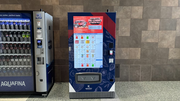News
Blind Entrepreneurs Get Onboard With Healthy Vending Machines
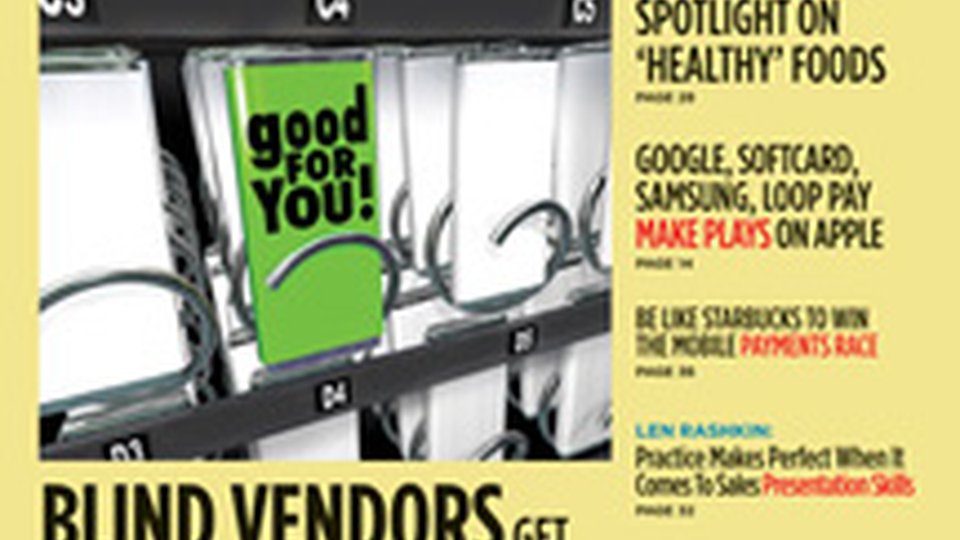
March 27, 2015
TAGS: vending, blind vendor, Pinky Harris, healthy vending, National Automatic Merchandising Association, Randolph Sheppard Vendors of America, Randolph-Sheppard Healthy Vending Work Group, National Association of Blind Merchants, BLAST vending conference, Billy Brumlow, Fit Pick, Nicky Gacos, We Fit Wellness, Dan Sippl |
Not too long ago, the nation's blind and visually impaired vending operators feared they'd be regulated out of business. When nutritional mandates dictating what they could sell in their machines at government facilities began multiplying two years ago, many blind vendors understandably reacted defensively. While the mandates haven't gone away, and vendors are no more fond of them than they were, the good news is that many of those impacted are finding their customers clamoring for more wholesome options. And blind vendors have found they can remain profitable while providing them.
Healthy vending rules at the local, state and federal levels continue to proliferate, constraining the entire vending industry. The National Automatic Merchandising Association has been successful at heading off some of the more stringent proposals by working with policymakers and helping operators to be proactive in broadening choices.
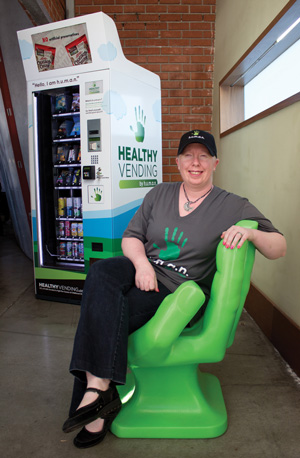 |
HEALTH PUSH:Blind vendor Pinky Harris strikes a pose in front of HUMAN vending machine, commemorating kickoff of partnership between the healthy vending franchisor and Randolph-Sheppard Vendors of America. |
The topic was the focus of a debate at the National Association of Blind Merchants' Business Leadership and Superior Training (BLAST) conference in fall 2013 in Indianapolis. It brought nutrition experts from government agencies and other health advocates together with blind vending operators who voiced their objections to regulation and advocated maintaining control of their machine menus to meet customer demand and ensure the profitability of their accounts.
All of the participants are part of the Randolph-Sheppard Healthy Vending Work Group, which longtime NABM leader Kevan Worley established shortly before the conference to open a dialogue between vendors and policymakers that he says has continued and led in a positive and constructive direction.
One big change since then, Worley said, is that increasing numbers of operators are taking a less defensive stance as they see a demonstrated, growing demand for "healthier" options. NABM has ramped up its resources to support blind vendors and ensure their success as they adapt.
The most recent BLAST took place in Austin, TX, in November, and healthy vending remained a prominent topic.
"If you have the right product in the right place in the right machine, you can please the customer, whose needs are changing, and still make money," Worley told VT. "Operators need to get ahead of the game and tell regulators they're already merchandising their machines with 30% healthy choices before there are official rules. Our folks need to get smart and realize that we need to offer more choices to beat back government regulations, or it will be 80%, 90% 100% of the machine that will be required to be healthy."
Worley reported that he's heard from operators -- initially forced to increase the percentages of healthier fare to their machines as a result of nutritional mandates -- who said that the switch turned out to be a positive one.
Billy Brumlow, a blind vendor from Tennessee who was very vocal in his opposition to any guidelines at BLAST 2013, is one of them. "Even Billy admits that he has seen change over two years! He has been able to use the National Automatic Merchandising Association's Fit Pick program and finds that he's still making a profit," Worley recounted. "He has transformed to the point that I'm thinking 'Who is this, and what did you do with Billy Brumlow?'"
He also cited a survey conducted by a state health agency that indicated that only 22% of employees used vending machines at government facilities. "We have to go after the 78% that we're missing," he urged. "The people who want Snickers and Cheetos already use the machines; we need to cater to those who are looking for items that they can't usually find there and we will build our business."
NABM recently endorsed Fit Pick as the nutritional standard of choice for blind entrepreneurs operating vending machines in government buildings. The association is encouraging all blind vending operators to ensure that a certain percentage of products they offer meets Fit Pick standards. The organization has pledged to work hand in hand with NAMA to educate blind entrepreneurs about products that meet those standards, and how to market them while maintaining profits.
"We believe in a balanced approach that focuses on giving customers choices," said NABM president Nicky Gacos. "We also believe that a critical piece of any strategy must include educating our blind entrepreneurs and host agencies on how to best achieve the goals of good health and profit."
Gacos emphasized that the challenges blind entrepreneurs face are no different from the rest of the vending industry. "Whether it is healthy vending, labeling, or the content of coins, we must work with NAMA to address critical issues, because what's good for the industry is ultimately good for blind entrepreneurs," he said.
Worley, a seasoned Colorado blind vendor, has launched an initiative called "WE Fit Wellness" through his consultancy, Worley Enterprises. It will collaborate with NABM to provide blind operators with the training and tools they need to succeed for programming machines with better-for-you products.
"WE Fit Wellness will train and assist concessionaires, vending operators and agencies to improve marketing techniques, increase profits and encourage lifestyle change on government property in the face of regulatory pressure as a result of the Affordable Health Care Act and market forces," Worley explained.
It will benefit blind merchants by leveraging its partnerships with government agencies, health and wellness experts, and product suppliers, along with its understanding of the needs and realities of government concession operations.
Randolph Sheppard Vendors of America is another advocacy group that represents blind vendors operating concession and vending businesses at federal and state properties. It, too, is urging its members to take a proactive approach to meeting the call from consumers and regulators for healthy vending.
The organization recently partnered with Los Angeles-based healthy vending promoter HUMAN as an option for its members to get on board with dedicated "healthy" machines and micromarkets. RSVA also recommends NAMA's Fit Pick program as a straightforward and effective solution for operators to bring a balanced mix of products to machines.
"We have to unlearn that healthy vending is a lost cause because many operators are thinking back to 12 or 15 years ago, when there was a call for healthier products, but there was little supply and products tasted like cardboard and cost more than consumers were willing to spend. Many operators got burned," said RSVA president Dan Sippl. "Now there is far better product and a growing supply of it and real demand. If you don't add some healthy items, you'll lose sales."
Sippl recalled that when he started in vending with 20 snack machines, he sold a case of Snickers a week. His company, Sip n' Snack Vending based in Eau Clair, WI, has grown to 40 machines and sells fewer of the popular candy bars now than it did in the early days, reflecting the trend.
The RSVA president emphasized that healthy vending is not about decreasing choices, as many operators perceive, but rather increasing them by catering to changing demands.
"Healthy is moving forward and we need to slow down and make sure we all are educated," he emphasized. "We often have to relearn and unlearn what we have learned. I had no soda or candy as a kid and had to eat my veggies before dessert. We have to get back to that 'barnyard' mentality that society is moving back to. Learning, unlearning and relearning takes time."
For every customer who requests a healthy item, it's likely that dozens of others want them too, but they are not asking, which is why it's so important for operators to make sure the choice is there, Sippl stressed.
He said his biggest concern as a vendor and RSVA president is that regulators and legislators are focused on putting healthy eating at peoples' fingertips, but are not experts in the food business or healthcare industry.
"Legislation without education is worthless and education can't stand on its own; you need the law behind you. If either falls behind, you have chaos," he said. "Just as with alcohol and tobacco, we've learned that prohibition doesn't work. The education process is more enduring, and that's what drives our organization."
He said RSVA's mission is to educate blind vendors and the industry as a whole about the resources available, and legislators about its efforts. "Not all vendors will buy in, but we want to make sure they know it can be profitable and give them a way to do it," Sippl said.
He said the debate over healthy vending profitability has been central to the lack of implementation by blind vendors, which led the association to publish a white paper, titled "Misinformation Shaping Public Policy: Healthy Vending and the Randolph-Sheppard Program." The RSVA president said it serves as foundation for furthering the healthy vending discussion based on verifiable studies that illustrate the positives behind a move to healthier choices -- not just personal testimonials.
"We can keep saying 'no' when we talk to CDC and the Department of Health, but healthy vending laws will happen," he cautioned. "We have to show we're willing to educate and spend resources to get people involved in healthy vending and be at the table so they can see if it's feasible. If we keep saying no, they won't ask for our input."
Blast » AUSTIN, TX, NOV. 18-21
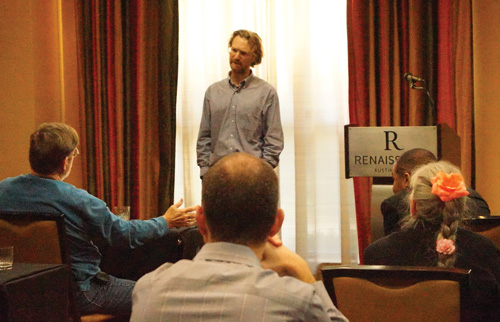 |
EXPERT ADVICE:Joel Kimmons, a nutrition scientist at the U.S. Centers for Disease Control and Prevention, leads BLAST breakout session to provide direction to blind vendors seeking to provide healthier options in their machines. |
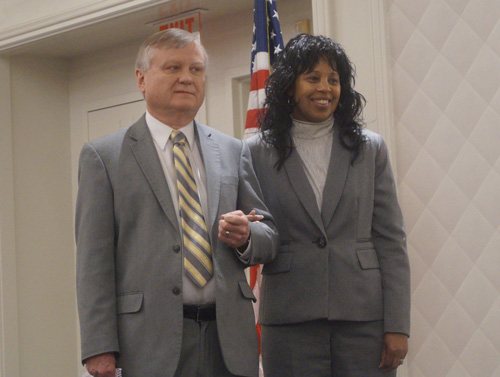 |
ON BOARD:Terry Smith, business opportunity specialist for the National Federation of the Blind Entrepreneur Initiative, and Janet LaBreck, commissioner of the Rehabilitation Services Administration (pictured at BLAST) support NABM in its efforts to educate blind vendors and promote Fit Pick standards to preempt mandates. |
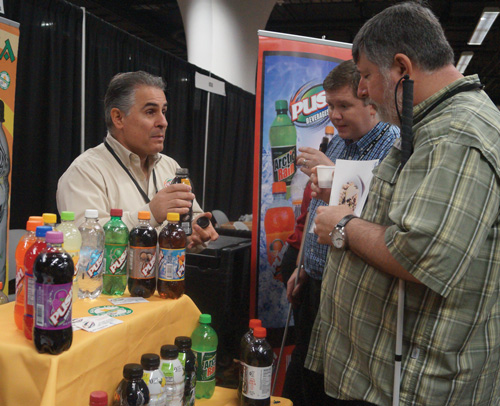 |
I'LL DRINK TO THAT:At BLAST trade show, Push Beverage hosts taste test of Tribe Tea, along with other drinks geared toward health-focused consumers. Push was recently named the official beverage of WE Fit Wellness program that NAMB is using to educate and assist blind vendors in implementing healthy vending. |




